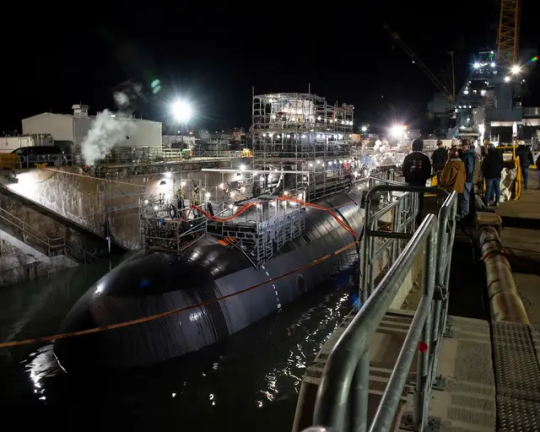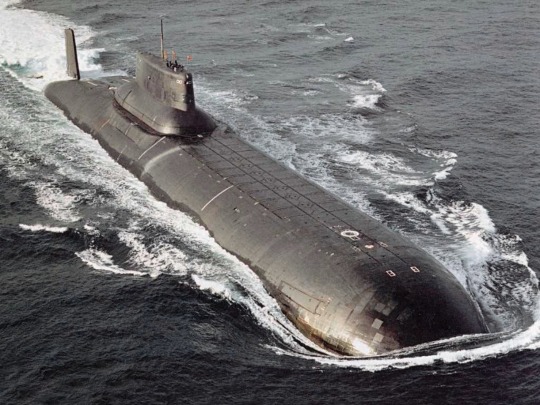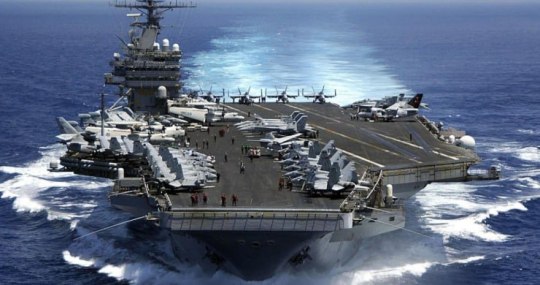#u.s. navy submarine
Explore tagged Tumblr posts
Text



"Drydock #3 at Portsmouth Naval Shipyard fills as USS TEXAS (SSN 775) prepares to undock. TEXAS is at the shipyard for a scheduled maintenance period."
US Navy photo by Mass Communication Specialist 1st Class Charlotte C. Oliver. Released on February 20, 2024.
240220-N-HV737-1007, 210220-N-HV737-1035, 240220-N-HV737-1021,
#USS TEXAS (SSN-775)#USS TEXAS#Virginia Class#Attack Submarine#Submarine#Warship#Ship#United States Navy#U.S. Navy#US Navy#USN#Navy#Portsmouth Navy Yard#Portsmouth Naval Shipyard#Seavey Island#Kittery#Maine#East Coast#Drydock#Dry Dock#February#2024#my post
130 notes
·
View notes
Link
Julia Parsons, a U.S. Navy code breaker during World War II who was among the last survivors of a top-secret team of women that unscrambled messages to and from German U-boats, died on April 18 in Aspinwall, Pa. She was 104.
48 notes
·
View notes
Text

Up from the sea in subs. Detail from an ad for the Electric Boat Company - 1944.
#vintage illustration#vintage advertising#electric boat company#ww2#wwii#ww2 era#wwii era#ww2 history#wwii history#u.s. military#u.s. navy#u.s. marines#u.s. marine corps#submarines#life during wartime#u.s. submarines#submarine service#the silent service#the 40s#the 1940s
13 notes
·
View notes
Text
Russia's Typhoon-Class Missile Submarine Is Something the Navy Can't Match
Russia's Typhoon-Class nuclear submarines were a vessel the U.S. Navy could never match in terms of size and total tonnage. They carried a massive amount of Nuclear Missiles.
— By Peter Suciu | Monday January 22, 2024

Image: Shutterstock
A Big Deal: The Russian Navy's Typhoon-Class — Nearly a year ago, Russia decommissioned the Project 941 Akula (NATO reporting name Typhoon) heavy nuclear-powered missile-carrying submarine cruiser Dmitry Donskoy several years earlier than expected. In fact, it had been only three years ago that the Kremlin announced the boat would remain in service until at least 2026, even as its role was reportedly limited to that of a weapons test platform for the new Borei-, Borei-A-, Yasen-and Yasen-M-class submarines.
In February 2023, it was officially confirmed that Dmitry Donskoy was decommissioned in February due to cost considerations. The submarine had served for more than 40 years in the Northern Fleet.
Initially designated the TK-208, she was the lead vessel of the Soviet third-generation Akula-class (Russian for "Shark"). She entered service in 1981 with the Soviet Navy, and after a 12-year overhaul and refit that began in 1990, she reentered service in 2002 as the Dmitry Donskoy, named after the Grand Duke of Moscow Dmitry Donskoy (1359–1389), the reputed founder of Moscow.
According to Russian media, Dmitry Donskoy initially carried D-19 strategic intercontinental ballistic missiles (ICBMs) as its basic armament. Following its upgrade under Project 941UM, it was involved in the tests of the seaborne Bulava ICBM.
Typhoon-Class: Project 941 Boats: The Sevmash Shipyard built six of a planned seven Project 941 submarines for the Russian Navy, and all were operational with the Northern Fleet. Though the oldest of the submarines, the Dmitriy Donskoy was also the last of the class to remain in service.
The TK-202, TK-12 – later renamed the Simbirsk – and T-13 were withdrawn from active service between 1996 and 2009, and scrapped with the financial support of the United States. Two other boats: the TK-17/Arkhangelsk and TK-20/Severstal remained in service until they were decommissioned circa 2013. A seventh boat, TK-210, was laid down but scrapped before completion.

With a displacement of 48,000 tons, a length of 175 meters (nearly 600 feet), a 23-meter beam, and a 12-meter draught, the Typhoon-class was the largest class of submarines ever built. Developed with multiple pressure hulls, including five inner hulls situated inside a superstructure of two parallel main hulls, the Typhoon-class was also wider than any other submarine ever built. The submarines were powered by OK-650 pressurized-water nuclear reactors, two 50,000 horsepower steam turbines, and four 3,200 KW turbogenerators and this provides the boat with the ability to sail at a speed of up to 22.2 knots on the surface and 27 knots whilst submerged.
Each contained nineteen compartments, including a strengthened module, which housed the main control room as well as an electronic equipment compartment above the main hulls and behind the missile launch tubes. It even was reported that there was a sauna on board as well as a small swimming pool for the crew. The sheer size of the submarines was likely welcomed by the approximately 160 sailors who called the submarine home on voyages lasting 120 days or longer, oftentimes without surfacing for months at a time.

The Typhoon-class subs were designed to counter the United States Navy's Ohio-class subs, which were capable of carrying up to 192 100-kiloton nuclear warheads. By contrast, the Soviet Typhoons could carry a primary cache of 20 RSM-52 SLBMs (submarine-launched ballistic missiles), each of which contained up to 10 MIRV (multiple independently targetable reentry vehicle) warheads.

Though the Dmitriry Donskoiy has been decommissioned, in 2021, a new sub of the Borei-class has already begun construction; and when launched, will bear the name of the legendary founder of Moscow.
— Peter Suciu is a Michigan-Based Writer. He has contributed to more than four dozen magazines, newspapers, and websites with over 3,200 published pieces over a twenty-year career in journalism. He regularly writes about military hardware, firearms history, cybersecurity, politics, and international affairs. Peter is also a Contributing Writer for Forbes and Clearance Jobs.
#The National Interest#Magazine#Blogs#Military#Economics#Technology#Russia 🇷🇺#Typhoon-Class#Missile Submarine#Navy#U.S. Navy 🇺🇸#Nuclear Missiles#Peter Suciu#Typhoon-Class: Project 941 Boats 🛶 🛥️ 🚤#TheNationalInterest.Org
4 notes
·
View notes
Text
Important Guideline to Follow for ASVAB Test Prep
The ASVAB is a crucial test for military enlistment, determining eligibility and job qualifications. Follow these key guidelines to prepare effectively and achieve your best score!
ASVAB TEST PREP : JOIN US AT PRIVATE STUDY GROUP 👈.

The ASVAB consists of 9-10 subtests depending on whether you take the computer-based or paper-based version. It measures skills in math, science, mechanical comprehension, word knowledge, and more.
What is 25% of 200?
A) 25 B) 50 C) 100 D) 75
✅ Answer: B) 50 Explanation: 25% of 200 = (25/100) × 200 = 50
If 4x = 32, what is the value of x?
A) 4 B) 6 C) 8 D) 12
✅ Answer: C) 8 Explanation: Divide both sides by 4: x = 32 ÷ 4 = 8
Improve your odds of guessing correctly. Skip tough questions and return to them if time permits. Don’t spend too much time on a single question. Move on and come back later if necessary. Take ASVAB practice tests 👈 to identify weak spots.
#navy officer test#oar online test#oar test#oar test prep#us navy test#u.s. navy#us navy officer test#marine officer test#navy ships#oar online classes#united states navy#us armed forces#submarine#us navy#oar classes#asvab test prep#asvab study tips#asvab online classes#asvab prep#asvab test#us army helicopter#us politics#us army veteran
0 notes
Link
The article, written by Peter Suciu, discusses the USS Long Beach, America's first nuclear-powered cruiser, detailing its history, technological advancements, and operational service from its construction in the late 1950s through its decommissioning in the 1990s. The USS Long Beach, built by the Bethlehem Steel Company, was notable for its nuclear propulsion, which provided it with unlimited range and led to its inclusion in significant naval missions like Operation Sea Orbit and the Vietnam War. Despite its groundbreaking design and capabilities, the article highlights the challenges and costs associated with the decommissioning and disposal of nuclear-powered naval vessels, drawing a parallel to the ongoing efforts to recycle the ex-USS Enterprise (CVN-65). The USS Long Beach's legacy includes influencing the continued use of nuclear power for U.S. Navy aircraft carriers and submarines.
#USS Long Beach#nuclear cruiser#U.S. Navy#guided missile cruiser#nuclear-powered warship#CGN-9#Cold War#technological innovation#naval warfare#USS Enterprise#missile systems#radar technology#anti-aircraft capabilities#anti-submarine warfare#reactor technology#sea power#naval history#military engineering#national security#ship design#operational history#deck operations#high seas patrols#maritime strategy#decommissioning.
0 notes
Text

BREAKING: Navy Intercepts Deep State Submarines Carrying Kids, Gold & Bioweapons — Military Locks Down Oceans Under Trump’s Orders
As of April 14, 2025, the U.S. Navy has locked down the Atlantic and Pacific in a massive military sting targeting elite-run trafficking, bioweapon transport, and deep-sea blackmail ops. This isn’t routine patrol — this is war.
Trafficking victims. Mobile CIA servers. Gold bars. Bioweapons.
All being extracted from vessels linked to billionaires, ex-agency operatives, and foreign “diplomats.”
These aren’t pirates. These are floating Deep State hideouts — and they’re being wiped off the map.
Trump is back. This operation is under direct military command — not civilian leadership.
GITMO is active. EBS is locked and loaded. Tribunals are not coming — they’ve begun.
On the East Coast, naval strike teams seized ships disguised as luxury liners. Below deck: surgical rooms, soundproof chambers, biometric systems, and unregistered children with no records. DNA matches tie them to CPS abductions across U.S. states.
One server retrieved mapped over 600 trafficking routes since 2012 — running through Italy, the Netherlands, Israel, and U.K. ports. Funded by “charities” tied to Clinton donors. The Epstein network didn’t die — it went mobile. Now it’s caught.
On the West Coast, it's even darker.
A submersible tied to a “research foundation” was captured leaving San Diego — carrying precursor agents for aerosolized behavioral control, encrypted tablets, and night-vision tech meant for offshore “medical” camps.
Crew included former CIA, UN peacekeepers, and a WEF consultant — all under fake identities.
Some vessels carried gold stamped with central bank seals, believed stolen during the 2008 collapse and laundered through IMF fronts. Others had sealed crates of bio-compounds traced back to DARPA and WHO partners.
Nine vessels silenced in 48 hours.
No GPS. No distress calls. Just vanished.
Naval divers are pulling up deep-sea data vaults dumped overboard — containing:
Blackmail dossiers on European leaders
Human trafficking-finance links with Big Pharma
Files on Antarctic underground cities marked for “climate relocation” by elite surnames
This is military justice, not courtroom theater.
No arrests. No media coverage. Just elimination.
No escape. No more oceans to hide behind.
If you're tied to child trafficking, gold laundering, stolen intel, or elite escape ops — you will be hunted. You will be erased.
There are no more safe harbors. The storm is here.
- Julian Assange
#pay attention#educate yourselves#educate yourself#reeducate yourselves#knowledge is power#reeducate yourself#think about it#think for yourselves#think for yourself#do your homework#do your research#do your own research#do some research#ask yourself questions#question everything#government secrets#government lies#government corruption#truth be told#lies exposed#evil lives here#news#situation update#save the children#save humanity#crimes against humanity#you decide#julian assange#what's happening#are you awake
384 notes
·
View notes
Photo
Date: September 7, 2013

Say hello to the USS Minnesota! A month ago today, the Virginia-class attack submarine USS Minnesota was commissioned in Norfolk, Va. Sailors assigned to the sub man the rails to “bring the ship to life” during the commissioning ceremony.
#USS Minnesota#USS MINNESOTA (SSN-783)#Virginia class#Submarine#United States Navy#U.S. Navy#US Navy#USN#Navy#commissioning#September#2013
97 notes
·
View notes
Text
So the next two Gerald R. Ford Class aircraft carriers will be named USS WILLIAM J. CLINTON (CVN-82) and USS GEORGE W. BUSH (CVN-83) was announced by President Biden.
Honestly, it's disappointing to see yet another carrier named after a politician. I was hoping for another Lexington, Saratoga, Midway or something other than a president or politician but I guess that's what we're left with these days.

The next Columbia class submarine will be named USS GROTON (SSBN-828), bucking the trend for ballistic missile submarines named after states or districts.
USS JACK H. LUCAS (DDG 125) completed acceptance trials, May 18, 2023. An example of an Arleigh Burke class. (source)
Instead, the name Intrepid is going to a Flight III Arleigh Burke class guided missile destroyer (DDG-145).

An artist rendering of the future U.S. Navy Columbia-class ballistic missile submarines. (source)
source, source

#Gerald R. Ford Class#Ford Class#USS WILLIAM J. CLINTON (CVN-82)#USS WILLIAM J. CLINTON#USS GEORGE W. BUSH (CVN-83)#USS GEORGE W. BUSH#USS GROTON (SSBN-828)#USS GROTON#Columbia Class#Submarine#USS INTREPID (DDG-145)#USS INTREPID#Arleigh Burke class#Destroyer#United States Navy#U.S. Navy#US Navy#USN#Navy#January#2025#my post
43 notes
·
View notes
Text
National Hero Day

At the start of World War II, the U.S. Navy restricted Black sailors to its “messman” branch. But the extraordinary heroism of Messman Doris “Dorie” Miller, who manned an anti-aircraft gun during Japan’s December 7, 1941, attack on Pearl Harbor, helped initiate change. Publicity by the NAACP and the Black press about Miller’s exploits helped convince FDR to award him the Navy Cross—the first ever given to a Black sailor. In April 1942, the Navy announced that Black recruits would be trained in a range of specialties beyond messmen—including combat positions.
Miller became an iconic emblem of the fight for Black civil rights and his likeness was reproduced on buttons, wartime commemorative items, and prints like this one: https://fdr.artifacts.archives.gov/.../black-americans...
In November 1943, he was killed in action while serving aboard the escort carrier Liscome Bay when it was sunk by a Japanese submarine.
The print is currently on display in the FDR Library's special exhibition, BLACK AMERICANS, CIVIL RIGHTS, AND THE ROOSEVELTS, 1932-1962: https://www.fdrlibrary.org/civil-rights-special-exhibit

242 notes
·
View notes
Text

Front cover: UNIVAC Defense System’s CP-890 shipboard computer brochure - 1967.
#the 60s#the 1960s#computing#vintage computers#vintage tech#vintage technology#technology#the digital age#vintage electronics#electronics#digital computers#digital computing#data entry#univac#sperry#sperry rand#the rand corporation#sperry univac#minicomputers#mainframe computers#data processing#military computers#polaris submarines#poseidon missile#defense contractors#military industrial complex#submarines#u.s. navy#slbm systems
14 notes
·
View notes
Text

USS HORNET (CVS-12) entering Pearl Harbor, Hawaii, following the Apollo 11 recovery. On deck are various aircraft of Carrier Anti-Submarine Air Group 59 (CVSG-59) and the Apollo 11 Capsule (CM-107). Following decontamination procedures, the three astronauts were placed in quarantine for 18 days until August 10, 1969.
Date: July 26, 1969
U.S. Navy photo: 428-KN-18090
#Apollo 11#Apollo CSM Block II#CSM-107#Columbia#NASA#Apollo Program#G-type mission#Recovery#USS HORNET (CV-12)#USS HORNET#Essex Class#Aircraft Carrier#1969#Pearl Harbor Navy Yard#Pearl Harbor#Hawaii#United States Navy#U.S. Navy#US Navy#USN#Navy#July#my post
174 notes
·
View notes
Text

An unusual catch, 11.11.2024
Off the coast of Norway, a 7800-tons, 115-metre-long U.S. Navy submarine has been caught in the net.
The USS "Virginia" caught a fishing net gear anchored in the seabed, which had just been cast out to catch halibut, and dragged it more than three and a half kilometres.
The U.S. Navy confirmed to the Norwegian radio station "NRK" that the submarine had become entangled in a fishing net in Malangsfjord near Tromsø. A Norwegian Coast Guard vessel, which escorted the submarine out of the harbour, quickly helped to remove the net.
The broadcaster "NRK" spoke to the fish buyer Egil Johansen, who says that American submarines regularly receive supplies from other ships in this sea area. The submarine was on its way back when it got caught in the fishing nets.
136 notes
·
View notes
Photo

Customer: DURING MY TIME IN THE U.S. NAVY I WAS ATTACHED TO A NUCLEAR POWERED FAST ATTACK SUBMARINE. THE LIC. PLATE FRAME HAS THE NAME AND HULL NUMBER OF THIS SHIP. DMV: NUCLEAR COULD BE HOSTILE Verdict: ACCEPTED
#California license plate with text NUC SUB#ACCEPTED#bot#ca-dmv-bot#california#dmv#funny#government#lol#public records
73 notes
·
View notes
Photo
Date: September 7, 2013

Creating a poster for the USS Minnesota for a friend of mine to help with his freelance opportunity. My first chance to work with hand written type, and I think it came out really well! I am really happy with how the poster is coming along and am looking forward to the feedback from the client! Wish me luck!
#USS MINNESOTA (SSN-783)#USS MINNESOTA#Virginia Class#Submarine#United States Navy#U.S. Navy#US Navy#USN#Navy#commissioning#September#2013
5 notes
·
View notes
